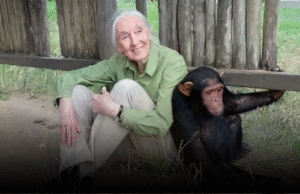
A Global Icon Passes Away ( Jane Goodall )
Jane Goodall, the world-famous scientist who transformed our understanding of chimpanzees and later became a global leader in animal protection, passed away on Wednesday at the age of 91. She died of natural causes while in California on her speaking tour, the Jane Goodall Institute confirmed. The statement honored her legacy: “Dr. Goodall’s work as a scientist changed the way we understand animals, and she worked hard to protect and heal our natural environment.”
Early Life and Childhood of Jane Goodall Dreams
Born on April 3, 1934, in Bournemouth, England, Jane Goodall developed a deep love for animals and nature from a young age. Inspired by books such as Tarzan and Dr. Dolittle, she dreamed of one day working with wild animals in Africa. Despite financial hardships, she attended secretarial school, took jobs to save money, and at age 23, traveled to Kenya — a journey that would change her life forever.
Meeting Louis Leakey: The Beginning of a Historic Journey
In Kenya, Jane met renowned paleoanthropologist Dr. Louis Leakey, who was impressed by her passion and determination. Leakey hired her and later arranged for her to study wild chimpanzees in Tanzania’s Gombe Stream Game Reserve. Believing her lack of formal training gave her a fresh perspective, Leakey helped secure funding while Jane prepared by studying primates at the London Zoo.
Arrival in Gombe: A Rocky Start to Groundbreaking Research
In July 1960, Jane Goodall arrived at Gombe with her mother and a cook, as required by local officials. The early days were challenging: she battled illness, harsh terrain, and long stretches without chimpanzee sightings. Yet these struggles marked the beginning of research that would revolutionize primatology.
Discoveries That Changed Science Forever
Goodall’s patient and immersive approach — living among chimpanzees rather than studying them from afar — led to remarkable discoveries. She documented chimpanzees using sticks to fish termites, proving tool use was not unique to humans. She showed that chimps eat meat, form social hierarchies, and even engage in conflict. Her work revealed complex communication and emotional bonds within chimpanzee communities, fundamentally altering how science views nonhuman animals.
From Scientist to Conservationist
As years passed, Goodall witnessed how habitat destruction and illegal trafficking endangered chimpanzees. These threats shifted her mission from research to advocacy. In 1977, she founded the Jane Goodall Institute, which continues to lead global conservation efforts. As the Institute put it: “She went into the forest to study the amazing lives of chimpanzees — and she came out of the forest to save them.”
Champion for Animal Welfare
Goodall’s voice carried far beyond Gombe. She partnered with groups like PETA to campaign against animal cruelty, including ending the confinement of chimpanzees in cages for laboratory experiments. Her activism reshaped the conversation around animal rights, pushing science and society toward more ethical treatment of animals.
Breaking Barriers in Science
Despite lacking formal academic training when she began, Goodall later earned her doctorate from the University of Cambridge — one of the first researchers to do so without a bachelor’s degree. Her groundbreaking discoveries drew support from National Geographic and propelled her into the global spotlight as both a scientist and humanitarian.
Inspiring Generations Through Books and Outreach
Jane Goodall wasn’t just a researcher; she was a storyteller. She authored numerous books, including works for children, that shared her life among the chimpanzees. These stories inspired countless young scientists, conservationists, and nature lovers. Many, like primatologist Freymann, credit her with shaping their careers and values: “She inspired my whole generation to go out and do it … She shaped the path of my whole career.”
The Lasting Legacy of Jane Goodall
Jane Goodall’s life and work bridged science, conservation, and compassion. From discovering tool use in chimpanzees to founding one of the world’s leading conservation organizations, she transformed our understanding of animals and our responsibility to protect them. Her legacy lives on in the forests she fought to save, the scientists she inspired, and the millions who continue her mission for a better world.



